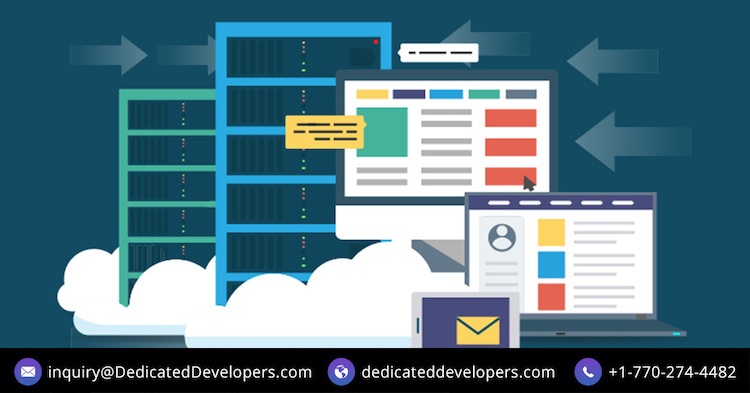
Scalability is all about handling growth. A successful web application needs to seamlessly and efficiently accommodate growth, and be designed with scalability in mind. A scalable web application will be able to handle an increase in users and load, without disrupting the end users.
Why Is Scalability Important?
In today’s world people want their data right away, instantly. There is no concept of waiting around for a web page to load, or an image to upload, or a form to process. If your application isn’t designed properly, and able to handle increased users and workload, then it will inevitably be left in the dust.
Scalability is crucial to the life of any web application, or it will simply fail to perform. Understanding what scalability is and how to harness the principles and standards from design right through to implementation is where most web and app development companies these days fail.
The Key Factors to Consider
For a web application to be considered scalable, several important factors need to be considered. We touch on a few here:
- Performance: At what saturation point will a web application start to experience problems? This all comes down to load balancing. For example, how quickly can your web application handle an increase in users?
- Recoverability: How quickly can your system restore to its original working state? After experiencing a failure, the ability to get back up and running quickly is essential. When a website is down for even short periods of time it can cost companies millions in revenue. Uptime is critical.
- Ease of Management: How easy are your web applications and processes to maintain and update? Scalable development should take this into consideration.
Scalability will help solve several problems related to performance and code maintenance. When scalable development is implemented, issues related to performance can be tackled head on, and code can be organized much more efficiently. Building a scalable web application is not a new language or framework, it’s a methodology and a set of principles that a business adopts.
When building a scalable web application you should take into consideration the overall experience of your users, page loading times, time required to make changes in the code, and even the cost of updating the entire application.
Related Article: Cost and Features to Develop a Web Application
What Are Some Commonly Used Tools?
Tools and processes that help businesses create scalable applications include cloud storage, load balancing software, implementing micro-services and caching.
Cloud Storage: Storage “in the cloud” is simply your application’s data being stored on remote servers, accessible from anywhere and with the ability to expand as required. Cloud storage providers take on the responsibility of making your data accessible and available.
Load Balancing Software: This software monitors the traffic usage to a web application and through a set of servers will portion out the users to spread the load across multiple servers. This prevents a problem where one server would have to handle a surge of users.
Micro-services: A method of developing decentralized systems and lightweight protocols that are modular in design, and allow for upgrading and maintenance without having to affect the entire application.
Caching: Effective use of caching within a web application will save costs on data loading and increase reusability. It allows for faster retrieval of data rather than always having to go back to the original source (i.e. a database).
Challenges To Consider When Building a Scalable Web Application
Several factors can affect the scalability of a web application such as choice of frameworks, load testing simulations, choice of hardware, and best practices implemented during design.
Choosing Frameworks: The technology stack your team chooses to implement can greatly affect your ability to create a scalable web application. You need to know what types of technology harness scalability and which don’t. For example, Node.js and Angular are well known for their superb scalability abilities.
Load Testing: Realistic load testing is important, so that you are able to correctly simulate the environment, users and data your web application might encounter. If realistic simulations aren’t dealt with during development and testing, then you will miss out on the development opportunities to address any issues before they hit the public.
Choice of Hardware: It can save a company a lot of money by purchasing the right hardware from the beginning. Hardware that can support scalability is essential. How easy is it to upgrade the RAM? Processor? Disk space? These are all factors that need to be considered.
Design Best Practices: There are literally hundreds of books written on the best design practices for scalability. Things such as asynchrony, database optimization, loose coupling, partitioning, caching are just a few.
If your team is not familiar with building scalable web applications, you may need to invest in a custom web development company that specializes in this area.
Related Article: Dealing with the Dilemma: Mobile App or Web Application to Choose First
Vertical Versus Horizontal Scaling
It’s important to understand the difference between vertical and horizontal scaling early on in the design process. This is because they can vastly influence the hardware and architecture you choose to implement. Vertical scaling is when you add more power to an existing server, such as RAM and CPU. Horizontal scaling on the other hand is when you add more servers. This is also known as “scaling up” versus “scaling out”. Most often horizontal scaling is going to be the best solution, as it doesn’t require down time (i.e., to upgrade a server) and is not limited to any type of resource caps.
As you can see, there are many things to consider when it comes to building scalable web applications. There are mobile app development companies in the USA that specialize in doing just this, and have years of experience dealing with a variety of scaling scenarios.
Dedicated Developers is a custom web development company, based and operated out of the USA that employs top app developers specializing in scalability. We’re here to answer any of your questions, so feel free to reach us at +1(770)274-4482 or drop us a line at inquiry@DedicatedDevelopers.com.











